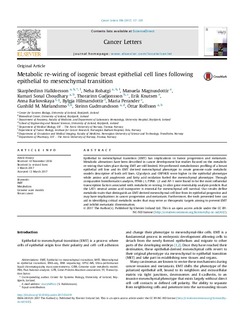| dc.contributor.author | Haldorsson, Skarphedinn | |
| dc.contributor.author | Rohatgi, Neha | |
| dc.contributor.author | Magnusdottir, Manuela | |
| dc.contributor.author | Choudhary, Kumari | |
| dc.contributor.author | Gudjónsson, Thorarinn | |
| dc.contributor.author | Knutsen, Erik | |
| dc.contributor.author | Barkovskaya, Anna | |
| dc.contributor.author | Hilmarsdòttir, Bylgja | |
| dc.contributor.author | Perander, Maria | |
| dc.contributor.author | Mælandsmo, Gunhild | |
| dc.contributor.author | Gudmundsson, Steinn | |
| dc.contributor.author | Rolfsson, Ottar | |
| dc.date.accessioned | 2018-01-31T15:53:06Z | |
| dc.date.available | 2018-01-31T15:53:06Z | |
| dc.date.created | 2017-03-15T12:58:02Z | |
| dc.date.issued | 2017 | |
| dc.identifier.citation | Cancer Letters. 2017, 396 117-129. | nb_NO |
| dc.identifier.issn | 0304-3835 | |
| dc.identifier.uri | http://hdl.handle.net/11250/2481085 | |
| dc.description.abstract | Epithelial to mesenchymal transition (EMT) has implications in tumor progression and metastasis. Metabolic alterations have been described in cancer development but studies focused on the metabolic re-wiring that takes place during EMT are still limited. We performed metabolomics profiling of a breast epithelial cell line and its EMT derived mesenchymal phenotype to create genome-scale metabolic models descriptive of both cell lines. Glycolysis and OXPHOS were higher in the epithelial phenotype while amino acid anaplerosis and fatty acid oxidation fueled the mesenchymal phenotype. Through comparative bioinformatics analysis, PPAR-γ1, PPAR- γ2 and AP-1 were found to be the most influential transcription factors associated with metabolic re-wiring. In silico gene essentiality analysis predicts that the LAT1 neutral amino acid transporter is essential for mesenchymal cell survival. Our results define metabolic traits that distinguish an EMT derived mesenchymal cell line from its epithelial progenitor and may have implications in cancer progression and metastasis. Furthermore, the tools presented here can aid in identifying critical metabolic nodes that may serve as therapeutic targets aiming to prevent EMT and inhibit metastatic dissemination. | nb_NO |
| dc.language.iso | eng | nb_NO |
| dc.publisher | Elsevier | nb_NO |
| dc.rights | Attribution-NonCommercial-NoDerivatives 4.0 Internasjonal | * |
| dc.rights.uri | http://creativecommons.org/licenses/by-nc-nd/4.0/deed.no | * |
| dc.title | Metabolic re-wiring of isogenic breast epithelial cell lines following epithelial to mesenchymal transition | nb_NO |
| dc.type | Journal article | nb_NO |
| dc.type | Peer reviewed | nb_NO |
| dc.description.version | publishedVersion | nb_NO |
| dc.source.pagenumber | 117-129 | nb_NO |
| dc.source.volume | 396 | nb_NO |
| dc.source.journal | Cancer Letters | nb_NO |
| dc.identifier.doi | 10.1016/j.canlet.2017.03.019 | |
| dc.identifier.cristin | 1458515 | |
| dc.relation.project | Norges forskningsråd: 239940 | nb_NO |
| dc.description.localcode | © 2017 The Author(s). Published by Elsevier Ireland Ltd. This is an open access article under the CC BYNC-ND license (http://creativecommons.org/licenses/by-nc-nd/4.0/). | nb_NO |
| cristin.unitcode | 194,65,25,0 | |
| cristin.unitname | Institutt for sirkulasjon og bildediagnostikk | |
| cristin.ispublished | true | |
| cristin.fulltext | original | |
| cristin.qualitycode | 1 | |

